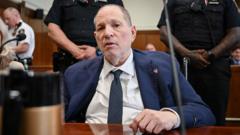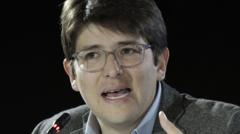US federal prosecutors have announced their intention to seek the death penalty for Luigi Mangione, who is accused of the premeditated murder of UnitedHealthcare CEO Brian Thompson. The case has ignited a broader debate regarding the US healthcare system and its perceived failures.
Death Penalty Sought for Man Accused of Killing UnitedHealthcare CEO

Death Penalty Sought for Man Accused of Killing UnitedHealthcare CEO
Prosecutors aim for capital punishment in the case against Luigi Mangione, the man charged with the murder of Brian Thompson, raising questions about healthcare-related violence in America.
US prosecutors have moved to seek the death penalty for Luigi Mangione, the individual charged with murdering Brian Thompson, the CEO of UnitedHealthcare, in December. Attorney General Pam Bondi issued a statement on Tuesday, emphasizing the calculated nature of the crime, referring to it as a “cold-blooded assassination.” Thompson was shot and killed outside a hotel in New York on December 4. Days later, Mangione was apprehended in Pennsylvania following a nationwide manhunt. Currently, he has pleaded not guilty to state charges and is awaiting trial in a New York prison for separate federal charges.
Bondi described Thompson’s murder as an act of political violence and raised the concern that Mangione's actions could have endangered others in the vicinity. Investigators noted that Mangione, 26, was motivated by his animosity towards US health insurance providers. Mangione’s attorney criticized the pursuit of the death penalty as “barbaric,” accusing the government of upholding a flawed healthcare system while advocating for state-sponsored execution. The attorney further claimed that Mangione is caught amid conflicting state and federal prosecution efforts, stating, “While claiming to protect against murder, the federal government moves to commit the pre-meditated, state-sponsored murder of Luigi.”
In New York, Mangione faces 11 state criminal counts, including first-degree murder and murder as a crime of terrorism, which in the event of conviction could lead to a life sentence without the chance of parole. Federal charges for using a firearm to commit murder and interstate stalking resulting in death render him eligible for capital punishment. The prosecution plans to keep both the federal and state cases progressing concurrently.
Thompson had been named chief executive of UnitedHealthcare, the largest private insurer in the US, in April 2021. After the shooting, authorities shared evidence against Mangione, including fingerprint matches from the crime scene. According to New York District Attorney Alvin Bragg, Mangione arrived in New York City on November 24 and used a fake identity while staying in a Manhattan hostel for ten days before the shooting. Thompson died after being shot in the back by an assailant concealed by a mask while entering a hotel hosting an investors' meeting for his company.
Mangione was located five days later at a McDonald's in Altoona, Pennsylvania. When apprehended, he possessed a ghost gun, a makeshift firearm assembled from untraceable parts, as well as a fake ID, passport, and a handwritten document that purportedly reflected his motivations and mindset. Thompson's murder has sparked a complex conversation about the state of the US healthcare system, with many Americans voicing dissatisfaction and perceived injustices regarding health insurance. US Homeland Security Secretary Alejandro Mayorkas highlighted the alarming rhetoric on social media following Thompson's death, indicating an unsettling trend of domestic violent extremism related to the nation's healthcare issues.




















